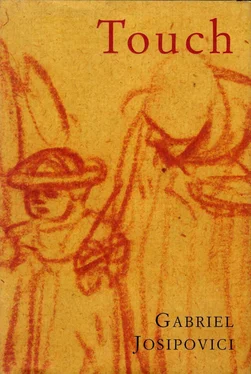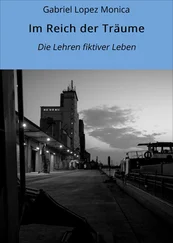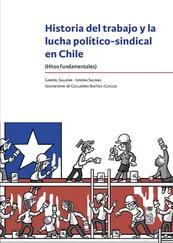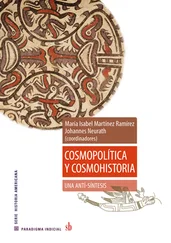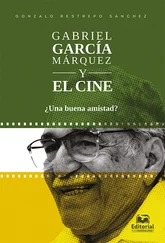Gabriel Josipovici - Touch
Здесь есть возможность читать онлайн «Gabriel Josipovici - Touch» весь текст электронной книги совершенно бесплатно (целиком полную версию без сокращений). В некоторых случаях можно слушать аудио, скачать через торрент в формате fb2 и присутствует краткое содержание. Год выпуска: 1996, ISBN: 1996, Издательство: Yale University Press, Жанр: Современная проза, на английском языке. Описание произведения, (предисловие) а так же отзывы посетителей доступны на портале библиотеки ЛибКат.
- Название:Touch
- Автор:
- Издательство:Yale University Press
- Жанр:
- Год:1996
- ISBN:0300066902
- Рейтинг книги:5 / 5. Голосов: 1
-
Избранное:Добавить в избранное
- Отзывы:
-
Ваша оценка:
- 100
- 1
- 2
- 3
- 4
- 5
Touch: краткое содержание, описание и аннотация
Предлагаем к чтению аннотацию, описание, краткое содержание или предисловие (зависит от того, что написал сам автор книги «Touch»). Если вы не нашли необходимую информацию о книге — напишите в комментариях, мы постараемся отыскать её.
Touch — читать онлайн бесплатно полную книгу (весь текст) целиком
Ниже представлен текст книги, разбитый по страницам. Система сохранения места последней прочитанной страницы, позволяет с удобством читать онлайн бесплатно книгу «Touch», без необходимости каждый раз заново искать на чём Вы остановились. Поставьте закладку, и сможете в любой момент перейти на страницу, на которой закончили чтение.
Интервал:
Закладка:
With your blind old father? What is this place, my child?
She answers him not with a name but with a description:
Here, where we are,
There is a kind of sacred precinct …
There is a seat of natural rock. Sit down and rest.
We must bear in mind that the Athenian stage is a clearly defined circular space, bare of props, fully visible to every member of the audience. As they wait for the play to begin, seated in the rising circular tiers, it is only a potential space, to be transformed into whatever the playwright wishes simply by virtue of his words playing on their imaginations. This play thus begins traditionally enough by setting the scene. What is startling is what Oedipus' blindness is already doing to the tradition. It is he, not just the audience, who is being informed about the locus of the play, and we are going to watch him, as he moves slowly round it, trying to relate what he feels with his outstretched hand to what he is told. In this way the audience, too, is made to experience the circular space it knows so well in quite a new way.
A man appears, a local countryman. He is horrified by what he sees: ‘Sir, before you ask me any question, come from that seat. That place is holy ground.’ Oedipus insists that this is where he was meant to come, and asks again: ‘What is this place?’ The countryman explains that it is Colonus, and, after repeating that it is sacred, adds:
It is not such a place as is famed in song and story,
But its name is great in the hearts of those that live here.
Like Colonus, the space where these plays were performed in Athens at the Festival of the Greater Dionysia was a kind of sacred space. No one knows exactly how it was viewed by the citizens of Athens. It was clearly not a place, like a temple, where rituals were enacted; but neither was it the completely desacralised space of our modern theatres. The theatre stood within the sanctuary of the god Dionysus, at the foot of the Acropolis, and the front row of seats consisted of marble chairs reserved for magistrates and priests, the central chair being that of the priest of Dionysus. The theatre was used not only for dramatic spectacles but for ceremonies of all kinds and even for meetings of the Assembly. Thus the plays performed there must have had a sacred and ritualistic quality which even the best modern productions cannot hope to emulate. Sophocles has thus elided two spaces, neither of which is ‘famous in legend’, as was the site of Apollo's shrine in Delphi, say, or even that of the Battle of Marathon, but both of which live in the hearts of those familiar with them: his native Colonus and the space in which the play is being enacted. Both are, ‘here, where we are …’.
Oedipus knows this is where the gods have meant him to come for his final act, though neither he nor the audience yet know what form this will take. Now he begins to feel out by touch that space which the audience has so often looked at and with which it must think that it is thoroughly familiar. The effect of this, as with the climactic scene in the Chaplin film, is to make us experience it for the first time and to make us feel with our bodies the mystery of theatrical representation, where a space is always two things at once (except in Waiting for Godot perhaps):
OEDIPUS
Give me your hand.
ANTIGONE
Here, father …
OEDIPUS
Further yet?
CHORUS
Further.
OEDIPUS
Again?
CHORUS
Lady, lead him; you understand us.
ANTIGONE
Feel your dark way as I lead you, father …
CHORUS
Stay now: you need not come beyond that slab or rock.
OEDIPUS
Here?
CHORUS
It is far enough.
OEDIPUS
I may sit?
CHORUS
To your left, there's a jutting ledge, low down.
ANTIGONE
I'll show you, father. Carefully now –
OEDIPUS
O dear!
ANTIGONE
One step at a time. Lean on my arm.
It is a slow and painful progress, but for the audience a strangely releasing one. In an almost ritualistic fashion Oedipus touches the different parts of the stage. And it is not just any man who is doing this, but a man whose terrible destiny has led to his becoming polluted and therefore a sacred presence. We must also, of course, think of the aged Sophocles ritually touching every corner of the stage which has been his life as he prepares to take his leave of it.
But the play has only just begun. Oedipus, we will discover, is merely passing through this space (and we must remember that these plays had no such thing as a ‘run’). He is, as it were, merely leaving a trace of his presence here before moving on. But ‘on’ is precisely where we cannot follow him, for it is not a place and not exactly a state. It is ‘where he will go when he has left this place’, and what that might mean the play will in due course try to convey to us.
Before that we witness a battle of wills as first Creon and then Oedipus' son Polynices try to persuade and then, when that does not work, to force Oedipus to return to Thebes with them, for an oracle has said that the side in the fratricidal civil war now raging there which holds the sacred body of Oedipus will be victorious. But Oedipus stands firm, and he is protected by Theseus, who rules over Colonus and Athens, and who ensures that Oedipus will do what he wishes and what the gods have told him, that is to wait here in Colonus for their call.
And now, with Creon and Polynices despatched, the call comes at last. Now it is time even for Antigone and Ismene to let go of their father:
The hand of the God directs me.
Follow, my children.
It is my turn now to be your pathfinder,
As you have been to me. Come. Do not touch me.
Leave me to find the way to the sacred grove
Where this land's soil is to enclose my bones.
This way … This way … Hermes is leading me,
And the Queen of the Nether world. This way … This way …
Dark day! How long since thou wast light to me!
Now ends my life for ever …
And so he leaves our sight, followed by his new-found protector, Theseus, to whom he had earlier said:
No, no: I am a man of misery,
Corrupt with every foulness that exists!
I cannot let you touch me. No, you shall not!
No one but those on whom it lies already
Can bear this heavy load with me. Stay then
And take my thanks, so. And be kind to me
Henceforth, as you are now.
Sophocles has reserved his greatest coup for the last. As always with this profoundly conservative and deeply innovative writer, what he does is simply to take a basic convention of the Athenian stage to unexpected lengths. Just as we were made to experience the sacred space of Colonus and of the tragic theatre through Oedipus' groping and polluted hand, so now we are made to experience that which this space is ultimately designed to celebrate, the meeting of man and god, not through something we see, not even through the kind of rich Shakespearean evocation of that which we do not see, like Edgar's ‘description’ of the cliffs of Dover for us and his blind father, but through a triple denial of the act of seeing.
In most Greek tragedies the audience does not witness the death of the hero but listens as a messenger arrives and tells how that death has occurred, a death which he himself has witnessed. In this play the messenger returns, but only to tell us that what he saw was not a man dying but a man shielding his eyes from the sight of another man passing away. ‘People of Colonus!’ the messenger begins, ‘I am here to say that the life of Oedipus is ended. And there is much to tell of all that I saw happen.’ And what he saw was this:
When we had gone a little distance, we turned round and looked back. Oedipus was nowhere to be seen; but the King was standing alone holding his hand before his eyes as if he had seen some terrible sight that no one could bear to look upon; and soon we saw him salute heaven and earth with one short prayer.
Читать дальшеИнтервал:
Закладка:
Похожие книги на «Touch»
Представляем Вашему вниманию похожие книги на «Touch» списком для выбора. Мы отобрали схожую по названию и смыслу литературу в надежде предоставить читателям больше вариантов отыскать новые, интересные, ещё непрочитанные произведения.
Обсуждение, отзывы о книге «Touch» и просто собственные мнения читателей. Оставьте ваши комментарии, напишите, что Вы думаете о произведении, его смысле или главных героях. Укажите что конкретно понравилось, а что нет, и почему Вы так считаете.
